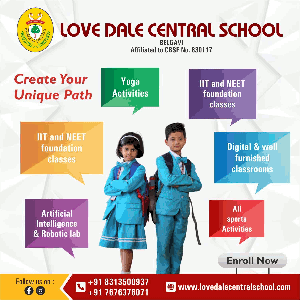The first education policy of the 21st century and constructive replacement of the 34-year-old National Policy on Education 1986 is talk of the town. The National Education Policy (NEP) has outlined many school education transformations. The following are a few important changes which I would like to appreciate as a school principal:
Pre- school [Nursery to UKG] Schooling in Kendriya Vidyalayas [A well begun is half done]
NEP focuses on Early Childhood Education and the holistic development of toddlers. Pre-school sections covering at least one year of early childhood care and education will be added to Kendriya Vidyalayas and other primary schools around the nation, particularly in disadvantaged areas.

Reducing the weight of bag and Bag- less days [ Let the childhood be lightly weighted]
The NEP advocates on reducing the syllabus and focusing more on experiential learning. It will reduce the weight of school bags. Even, bagless days will be encouraged throughout the year for various types of enrichment activities involving arts, quizzes, sports, and vocational crafts.
Replacing the Schooling Structure of 10+2 [An idea to handle academics with care ]
The NEP replaces the 10+2 structure of schooling by a 5+3+3+4 structure corresponding to ages 3-8, 8-11, 11-14, and 14-18 years respectively.
1. Foundational Stage: Students in the age group of 3-8 years will be part of the foundational stage. This stage will be split into two: Three years of playschool/anganwadi and two years in primary school (grades 1 and 2). This policy brings into the fold the already existing playschools into the formal education.
2. Preparatory Schooling Stage: For children between 8-11 years of age in grades 3 to 5. There will be a greater emphasis on experiential learning across the sciences, mathematics, arts, social sciences, and humanities.
3. Middle school: For students between 11-14 years in grades 6 to 8. The thrust for this level will be to have a subject-oriented pedagogical learning style.
4. Secondary level: The final stage is for students between 14-18 years. This stage is again split into two sub-stages: covering grades 9 and 10 in one cohort and grades 11 and 12 in another.
According to the NEP school students will take exams only for Classes 3, 5, and 8. Assessment in other years will shift to a “regular and formative” style that will be more “competency-based” to promote learning and development testing “higher-order skills, such as analysis, critical thinking and conceptual clarity”.
Three Languages Formula – As per state and regions [Having a voice for Mother Tongue] The three-language learned by students will be the choices of States, regions, and of the students, so long as at least two of the three languages are native to India. So, if one is learning English then he/she can’t learn any other foreign language in school as a part of syllabus.
Medium of instruction – local or regional language [Vocal for Local]
Section 5 says, wherever possible, the medium of instruction until at least Grade 5, but preferably till Grade 8 and beyond, will be the home language/mother tongue/local language/regional language.
Experiential learning with arts and sports-integration [A step towards Fit India]
Curriculum content will be reduced in each subject to its core essentials, and make space for critical thinking and more holistic, inquiry-based, discovery-based, discussion-based, and analysis-based and arts-integrated and sports-integrated learning. Arts and sports-integrated Curriculum will promote mental and physical fitness among the students.
No Streams Separation for students. [ A passage to multidimensional learning]
students will be offered choice of subjects to study, particularly in secondary school – including subjects like physical education, the arts and crafts, and vocational skills There will be no hard separation of Science, Arts and Commerce. Subjects like physical education, the arts and crafts, and vocational skills will be incorporated throughout the school curriculum as main subjects.
Relaxing the Board Exams Rules and Regulations [ Why should Exams have all the fun]
Boards may over time also develop further viable models of Board Exams, such as – semester/modular Board Exams. Board exam can be conducted twice a year. Board exam should promote knowledge application rather than rote learning.
Promotion of Vocational Subjects [ Determination to be Atmanirbhar Bharat ]
The policy says vocational education will be integrated from class VI and an internship of 10 days at the school level will be made part of the system. Every student should learn one vocational skill such as carpentry, electric work, metal work, gardening, pottery making, etc., as decided by States and local communities during Grades 6-8.
Don’t run behind success. Run behind excellence. Eventually, success will come running behind you is seen to be core idea of NEP 2020.
It is one of the most important transformations we have seen after independence. The foreign Education Board is mushrooming in India because they have all these features in their education system from the last 10 years. Now the execution will matter a lot to gain desired success. Finally, I can just have a hope that it will help us to shine once again as Vishwa Guru. Well Done India.

Dr. Manjeet Jain
Principal – Jain Heritage School – Belgaum
The author has written dozens of articles for various newspapers like TOI, DNA etc. He has been writing a blog for SPEAKING TREE since 2010.
[ The article is written only about school education ]



The New education policy 2020 is a step in the right direction but what will matter is the implementation of this policy. This is just a vision statement… The nitty gritty has to be worked out. Teacher training will be extremely crucial for successful implementation of this policy. Good article explaining the policy.